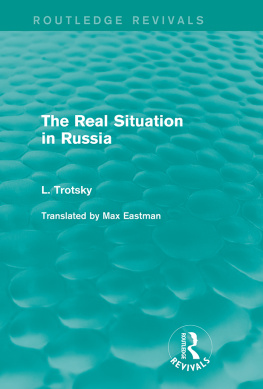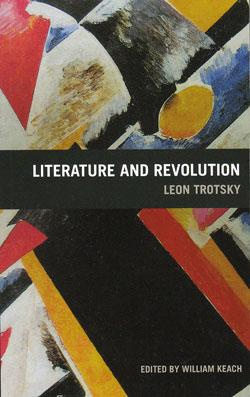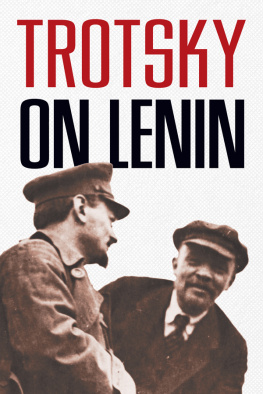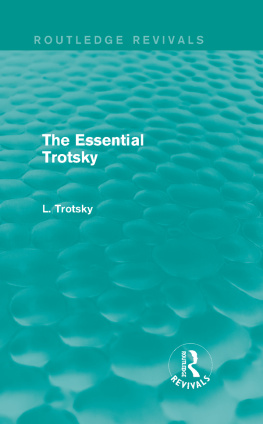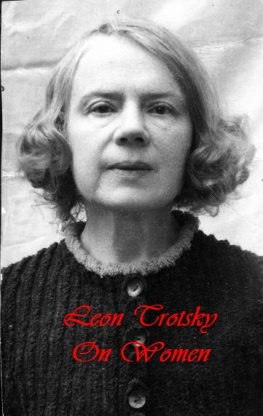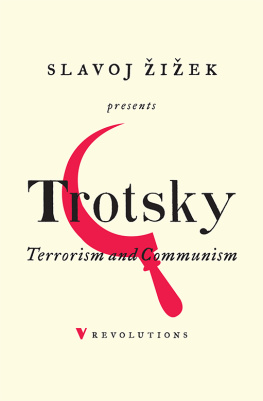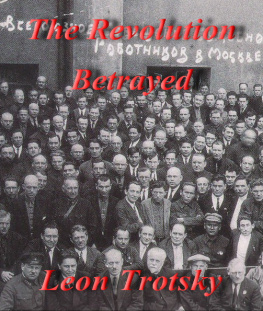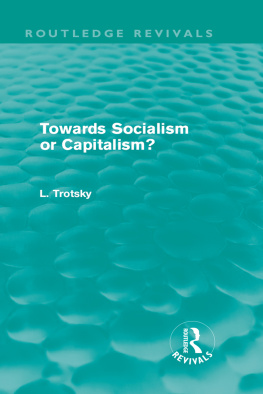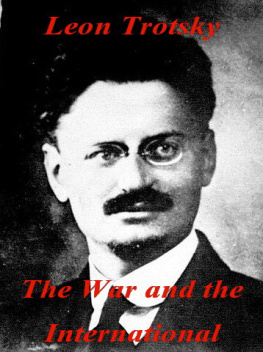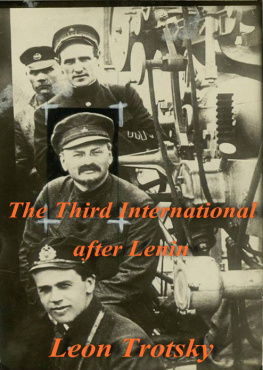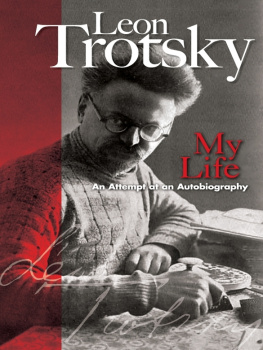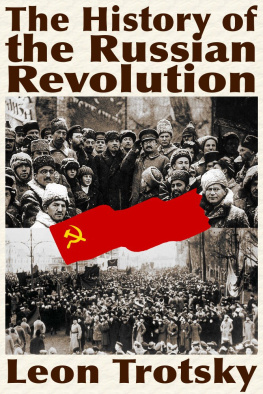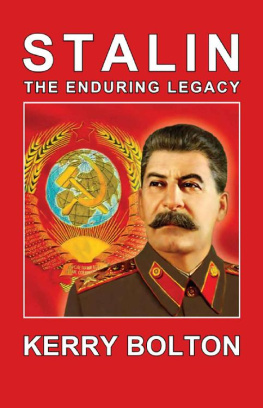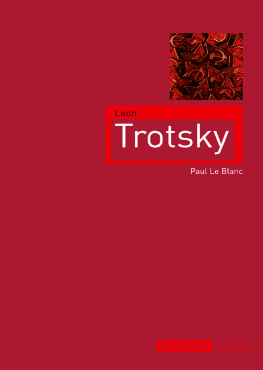Routledge Revivals
The Real Situation in Russia
This title, first published in 1928, contains three of Trotskys harshest rebuttals of Stalins takeover of the Russian Revolution following the death of Lenin. The first part contains a defence of the Opposition Platform against the Stalinist denunciation; the second details Trotskys view of the precise nature of the Stalinist program, as well as its disastrous consequences for Russia; and the third demonstrates the unashamed falsification of the history by Stalin with regard to the beginning of the Revolution.
Including a sympathetic, but nonetheless astute, introduction to Trotskys argument by the translator, The Real Situation in Russia will be of value to all students of twentieth-century Marxism, and in particular to those interested in the Russian Revolution.
First published in 1928
by George Allen & Unwin Ltd
This edition first published in 2014 by Routledge
2 Park Square, Milton Park, Abingdon, Oxon, OX14 4RN
and by Routledge
711 Third Avenue, New York, NY 10017
Routledge is an imprint of the Taylor & Francis Group, an informa business
1928 George Allen & Unwin Ltd
All rights reserved. No part of this book may be reprinted or reproduced or utilised in any form or by any electronic, mechanical, or other means, now known or hereafter invented, including photocopying and recording, or in any information storage or retrieval system, without permission in writing from the publishers.
Publishers Note
The publisher has gone to great lengths to ensure the quality of this reprint but points out that some imperfections in the original copies may be apparent.
Disclaimer
The publisher has made every effort to trace copyright holders and welcomes correspondence from those they have been unable to contact.
ISBN 13: 978-1-138-01524-1 (hbk)
ISBN 13: 978-1-315-79450-1 (ebk)
Introduction
The Confusion about Russia
An unusual confusion reigns among thinking people the world over as to the issues in conflict between Trotsky and Stalin. The international business men and the capitalist press are pretty well agreed that, as a choice between evils, Stalin is their man. According to a despatch in the New York Times, stocks in the concession-industries, and even bonds of the old regime, rose on the London market at the news of Trotskys deportation. The Communist officials, on the other hand, and their press, continue to assert in every corner of the earth that Trotsky is the leader of a petty bourgeois or social-democratic deviationeven that he is a counter-revolutionistand that Stalin is the true Bolshevik. An intermediate group, composed of liberal sympathizers and intellectual tourists into Russia, or into communism, imagine that there is no political issue whatever. It is a mere personal struggle for power. Trotsky got beaten and refused to behave. Or Trotsky does not understand party discipline. Some of the more nave and recent of these tourists actually believe that Trotsky, Rakovsky, Radek, Preobrazhensky, and thirty to fifty more of the fighting leaders of the October Revolution have been sent away to Siberia, like children to the nursery, because they insisted on talking at the wrong time. They wanted to hold a discussion when all the adult and serious Communists thought only of getting to work building socialism in one country.
This blissfully innocent idea, and also the confusion underlying it, disappear quickly when you read the actual platform of Trotsky and the Opposition, suppressed and outlawed by the Stalin rgime. In this platformwhich I have entitled The Real Situation in Russia and The Tasks of the Communist Partyit is clear what the Opposition is fighting for and against whom. They are fighting for the life-interests of the lower classes, the rank-and-file industrial workers, the farm hands, and the poorer peasants; for forms of organization which will permit those interests to dominate politically over others; and for honest scientific thinking about the problem of fulfilling those interests, and the ultimate interests of mankind, in a communist society.
Marxian socialism used to be defined as a union of science with the proletariat. Bolshevism might be defined as a union of science with the proletariat through the mediation of certain forms of party, soviet, and trade-union organization. It is one of these three thingsscientific thinking, or the proletariat, or the Bolshevik forms of organizationthat Trotsky and the Opposition are defending in every sentence of this platform. They are defending the proletariat against the indubitable encroachment of three anti-proletarian elementsthe Nepmen or new capitalists, the Kulaks or rich peasants, and the gradually crystallizing class of political, industrial, and trade-union bureaucrats, who inevitably fall more and more under the influence of the Nepmen and Kulaks. They are defending the Bolshevik forms of organization as conceived by Lenin against Stalins perversion of them in the direction of bureaucracy, clique-rule, and personal dictatorship. And they are defending scientific thinking against dishonest political big-talk, demagogism, juggling of statistics, Jesuitry, and a deliberately adopted campaign of all-Russian and international lying.
These three things are not unrelated to each other, as every one familiar with the labor struggle knows. The situation in the Russian Communist party is in its essence both typical and familiar. It is the old fight of the clear-headed, honest, and thorough-going revolutionist standing for the real interests of the rank-and-file workers and of the proletariat as a class, against the solidifying machineagainst the disguised reactionary policy, the consciously and unconsciously hypocritical talk, the organizational trickery and brutality, of the proletarian politician, the professional labor leader, the foggy-minded socialist, joined together in a perfect union with the innumerable host of those who call it practical to keep still while things go wrong. Nothing new in the history of the labor movement, nothing in its essence obscure or unintelligible, or even unexpected by those who gave some thought to the future of the Russian revolution.
But there are certain unusual features in the present situation which obscure its nature, and make it difficult even for those long familiar with such situations to perceive clearly. Heretofore all proletarian organizations have been struggling for power in a capitalist society. The Russian Communist party has captured the power, and controls the entire industrial and political life of the nation. This gives to the conflict between the reactionary machine and the thorough-going proletarian revolutionists in that party an unfamiliar aspect. In the first place the machine is far more revolutionary than it would be in a capitalist country. Not only is it so instinctively, but it has to be. It is neither subject to the influence, nor equipped with the support, of a capitalist state, a powerful bourgeoisie, and an anti-proletarian public opinion. It is proletarian in sentiment, and is compelled either to dupe or to conciliate the toiling masses at every backward step it takes. This accounts for the zigzag course traced by Stalin in a reactionary direction. Since he presides over the organizations of a victorious revolutionary working-class, such a deceptiveand most likely also self-deceptivecourse is the only one he could trace in a reactionary direction. This fact is easily forgotten, especially by spectators in other countries, and to them Stalin appears to be offering revolutionary leadership when he is giving a quite unavoidable expression to the will of a revolutionary proletariat. His bureaucracy is actually doing just what every crystallized labor-bureaucracy doesbalancing itself in power between the proletarian and bourgeois class forces. But the proletarian force is so much stronger in Russia than elsewhere in the world, that to a casual observer this bureaucracy appears to be throwing its full weight on the side of the proletariat.

